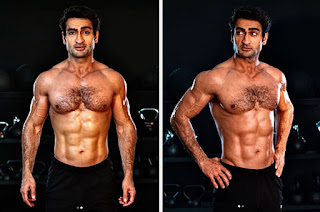Kumail Nanjiani born is a Pakistani-American comedian, actor, screenwriter, and podcaster primarily known for his role as Dinesh in the HBO comedy series Silicon Valley and for co-writing and starring in the romantic comedy film The Big Sick (2017).
For co-writing the latter with his wife, Emily V. Gordon, he was nominated for the Academy Award for Best Original Screenplay. In 2018, Time magazine named him one of the 100 most influential people in the world.
Recently, the actor was interviewed in New York magazine about his upcoming role in superhero flick The Eternals. The article delves into Nanjiani's transformation from a lovable nerd into a muscle-bound superhero.
In the profile, writer E. Alex Jung begins: "Kumail Nanjiani would like to remind everyone about his brain, but I’ve brought him to the gym to talk about his muscles. He gets that this is all people — especially men — have wanted to talk about since the photos. You’ve seen them. He strikes a superhero pose, his shirtless torso slicked with baby oil, displaying branching veins that crisscross his arms like a complex irrigation system. Brows arched, he gazes at something in the middle distance — more muscles? He posted them from the set of Eternals in December 2019, the culmination of a 14-month process that began almost immediately after the director Chloé Zhao cast him in the movie as a (roughly) 7,000-year-old Earth defender named Kingo.
You can read the article here.
Highlights from the interview include:
Kumail Nanjiani on becoming an internet punching bag after his buff photos went viral:
“The way I look has been way too important to me,” says Nanjiani, now 43. “And so to hear a bunch of people reaffirming my own darkest thoughts about myself was very difficult.”
On his weight:
“I’ll tell you, man, it’s very easy to get obsessed with that number on the scale,” says Nanjiani. “It’s a tough thing. It’s deceiving. You become obsessed with it. I certainly have, and for me, it’s not great to weigh myself every day. I could tell you what I weigh today.”
On friendships and insecurities:
“Honestly, I thought the only reason people would be friends with me was because they felt bad for me.”
On criticisms he got about The Big Sick’s depiction of Pakistani women:
“Our movie was the first one in a long time where there were multiple Desi female characters, and the first few you see are reduced,” he says. “People wanted to see themselves. It’s something I completely regret. I would not do it that way now.”
New York magazine and Vulture.com are part of the Vox Media Network.
Check out the article here.

Comments
Post a Comment
Thank You for your input and feedback. If you requested a response, we will do so as soon as possible.